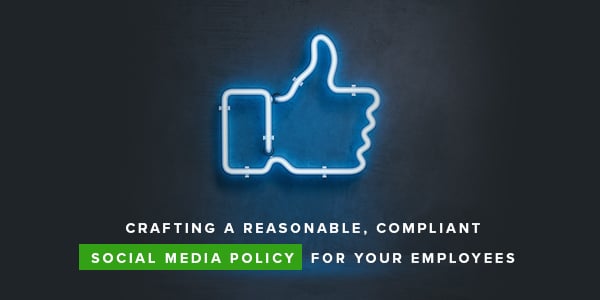 We know our employees do it. But, do we as their employer have a right to regulate it?
We know our employees do it. But, do we as their employer have a right to regulate it?
We are, of course, talking about social media.
HR asks this question all the time regarding social media, and the answer can be difficult to pinpoint. Every organization must decide the protocols they want to put, if any, in place, and how to write the policy so it’s fair to the employee and protective of the workplace.
Does a company have a right to require or prohibit their employees from certain social media posts? And what are the consequences of breaking such a policy? Read on to have all your questions answered.
“According to Pew Research, 63% of Americans say their company has no social media policy.”
First, let’s talk about what employers shouldn’t do.
Require employees to cough up passwords. Never, ever, for any reason ask employees for their social media passwords. It’s an invasion of privacy and can result in litigation. Managers should also be careful about “friending” their team on social media sites. A smart practice is to accept friend requests from subordinates if you like but avoid initiating the connection.
“Call out” employees on social media. Judy takes a sick day. Judy posts a photo of herself at a pool party later that day. What should you do about Judy? Don’t reply to her photo saying “uh, you are in big trouble, lady”. Social media isn’t the place for reprimands. Wait until Judy comes back to work, talk with her about her actions, and lay out the consequences then.
Now, let’s talk about what HR can do regarding a social media policy for employees.
Seek input. Talk to the C-suite, hiring managers, supervisors, and, most importantly, your employment attorney as you’re creating your social media policy. Funnel these ideas into a cohesive document.
Gear the policy toward legitimate business interests. It’s important to directly link your requirements to the company. Protecting its reputation, safeguarding its clients, and decreasing the impact of potential workplace conflict are all components that fit into such a policy.
Clearly define what cannot be posted. Specific language is the best way for employees to understand exactly what is expected of them when they are sharing on social media. Racism, sexism, comments against religion, bullying, drug use, and malicious behavior should not be tolerated. Activities that would put the company in a bad light or those that are illegal should be included in the policy, too.
Address posting confidential company, client, and employee information. Some people surprisingly believe their social media posts are private, and feel free to rant about their work life. While vague comments like “work was a beast today” are not typically forbidden, sharing proprietary information about the organization, its employees, and clients can be. Make it clear sharing this information on a public forum won’t be tolerated.
Engage in transparent discussions encouraging good judgment when using social media. We ARE talking about adults here, right? During social media policy discussions and crafting the documents, reiterate using good judgment when deciding what to post on personal social media channels.
Finally, here’s how to address unacceptable social media posts.
It can be touchy deciding how to discipline an employee who posts inflammatory, confidential, or vulgar material to social media. It’s a good best practice to start with small actions and work up to larger consequences.
Discuss and ask them to remove the post. Meet with the employee, acknowledge you’ve seen the post, explain why it’s unacceptable, and ask them to remove it.
Write them up. If the behavior continues, or if the employee refuses to remove the post, write them a warning and add it to their employee file.
Suspend them. Send them home for 1-3 days.
Terminate them. If the employee will not follow your social media policy and continues to post content that goes against the company’s policy, remove them from employment. Document the steps taken that lead to this decision. (Be sure to discuss this move with your employment attorney).
There may be times when this process can’t be followed. If, for example, the employee is making threats of violence against managers, customers, or coworkers on social media, the prudent option may be to fire them immediately. Remember, it’s all about keeping the workplace safe and preserving the company’s reputation.
Deciding on the best course of action for your company's employee social media policy is challenging, if for no other reason than social media platforms are still The Wild West. By proactively addressing the goals HR needs the policy to meet, and identifying the behaviors that won’t be tolerated, your organization can feel secure that the risk of a social media post harming other employees, vendors, or the company itself are minimized.



